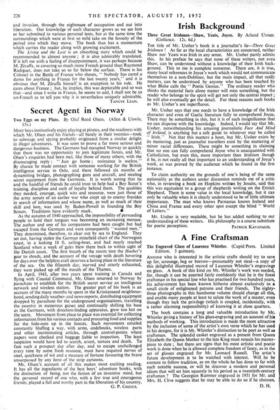Irish Background - ;
Three Great Irishmen—Shaw, Yeats, Joyce. By Arland Ussher. (Gollancz. 12s. 6d.) Three Great Irishmen—Shaw, Yeats, Joyce. By Arland Ussher. (Gollancz. 12s. 6d.) THE title of Mr. Ussher's book is a journalist's lie—Three Great Irishmen! As far as the local characteristics are concerned, neither Shaw nor Yeats was Irish in any sense. Mr. Ussher partly admits this. In his preface he says that none of these writers, not even Shaw, can be understood without a knowledge of their Irish back- ground. This to me is complete nonsense. There are, it is true, many local references in Joyce's work which would not communicate themselves to a non-Dubliner, but the main impact, all that really matters, can be understood by anyone who has been touched by what Blake calls the "Poetic Genius." The ordinary reader who thinks the material facts alone matter will miss something, but the reader who belongs to the spirit will get not only the central impact • he will also eventually get the detail. For these reasons such book; as Mr. Ussher's are superfluous.
Mr. Ussher says that one needs to have a knowledge of the Irish character and even of Gaelic literature fully to comprehend Joyce. There may be something in this, but it is of such insignificance that we can dispense with the knowledge. Indeed, I would say that Mr. Ussher, notwithstanding his amusing journalistic Face And Mind of Ireland, is anything but a safe guide to whatever may be called " Irish." Not that this matters a hoot, but Mr. Ussher exists by its mattering, just as journalist travellers exist by the mattering of minor racial differences. There might be something in claiming that no one can fully comprehend Joyce who is unacquainted with Catholicism, but even this, more important than Irishism though it be, is not really all that important to an understanding of Joyce's work, as was proved by the audience which he found in the first instance.
To claim authority on the grounds of one's being of the same nationality as the authors under discussion reminds me of a critic who, in reviewing a book on Hopkins written by Jesuits, said that this was equivalent to a group of shepherds writing on the Ettrick Shepherd. There is some value in the local knowledge, but it can only be valuable when it is clearly understood to be of little ultimate importance. The man who knows Parnassus knows Ireland and China and France and every other spot except the blind "World of Letters."
Mr. Ussher is very readable, but he has added nothing to our understanding of these writers. His philosophy is a coarse substitute


























 Previous page
Previous page